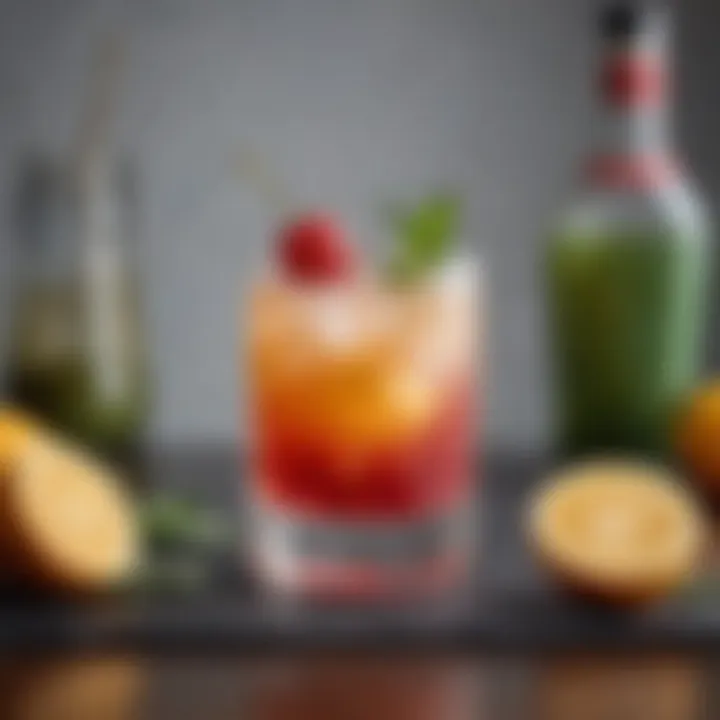Discovering Gluten-Free and Sugar-Free Alcohol Choices


Intro
With the winds of change sweeping through culinary landscapes, many of us find ourselves navigating the intricacies of dietary restrictions. Gone are the days when indulgence in a drink meant surrendering to sugar and gluten. Today, we can sip with confidence, enjoying a growing selection of gluten-free and sugar-free alcoholic options.
Whether you’re grappling with intolerances, health considerations, or simply seeking a cleaner lifestyle, this guide is tailored for you. We aim to lift the veil off several drink choices that allow you to quench your thirst without the guilt. Amidst the barrage of labels and buzzwords, we’ll clarify what exactly gluten and sugar-free really mean in the context of beverages. Armed with information on ingredients, health benefits, and mixology tips, you'll be well-prepared to elevate your drinking experience.
Each section will unravel layers of knowledge, from the essential ingredients that make up these beverages to the nutritional considerations you should keep in mind. As we explore further, get ready to grasp the beauty in pairings that promise a full flavor experience while honoring your dietary choices.
Understanding Dietary Restrictions
Dietary restrictions aren't a passing fad; they come from deep-seated personal health needs, ethical choices, or lifestyle preferences. It's important to understand these needs, especially in the realm of alcohol consumption, where many traditional options may not align with an individual's requirements. As people become more aware of their health and diet, the demand for gluten-free and sugar-free options has surged. This shift paves the way for informed choices that honor personal health without sacrificing enjoyment.
The Needs Behind Gluten-Free Choices
Gluten intolerance and celiac disease affect millions worldwide. For those dealing with these conditions, consuming gluten can lead to severe health issues, making gluten-free options crucial. When it comes to alcoholic beverages, drinkers often find themselves navigating murky waters. Many believe that beer and certain spirits pose an inherent risk due to their grain content. However, understanding what constitutes gluten is key.
Common gluten-containing grains include wheat, barley, and rye. That's where the importance of selecting specifically gluten-free choices becomes clear. Many crafters of alcohol have started developing alternatives made from gluten-free grains such as sorghum and rice. These drinks offer a safe haven for gluten-sensitive individuals, yet they can still enjoy a wide range of flavors and experiences.
Moreover, gluten-free drink options are not just for those with allergies. Many have come to appreciate the lighter, crisper flavors found in these beverages. This growing trend is catching on; thus allowing everyone to imbibe responsibly while keeping health considerations in mind.
The Relevance of Sugar-Free Options
Sugar is everywhere, even in places where you'd least expect it, like cocktails. For those monitoring their sugar intake, be it for weight management, diabetes, or other health reasons, recognizing the hidden sugars in alcoholic drinks is essential. Some people are simply stepping away from excess sugars to enjoy a cleaner, more genuine taste of their favorite beverages.
Sugar-free drinks offer a way to indulge without the guilt. Many traditional cocktails, for instance, use syrupy mixers that bloat one's waistline and blanket the more delicate flavors of spirits. By opting for sugar-free varieties, drink-lovers can experience the true essence of a spirit.
Gluten-free and sugar-free are not just buzzwords in this age of health-conscious living; they represent a conscious decision to care for one’s body without forgoing pleasure. In the end, understanding dietary restrictions leads to a more informed and enjoyable drinking experience, allowing all to raise their glasses with peace of mind.
"Choosing gluten-free or sugar-free isn’t merely about restrictions, it’s about empowerment. It’s about embracing choices that respect your body and health goals."
By weaving health awareness into the drinking culture, individuals are finding more joy in their options than ever before.
The Nature of Gluten in Alcoholic Beverages
Understanding gluten's role in alcoholic drinks is vital, especially for those navigating dietary restrictions due to celiac disease or gluten sensitivity. This section sheds light on gluten's presence in beverages, aiming to clarify common misconceptions and highlight the importance of choosing gluten-free options in alcohol.
Identifying Gluten-Containing Ingredients
Beer often comes to mind when discussing gluten, given that traditional brewing relies heavily on wheat, barley, and rye—all of which contain gluten. However, the conversation shouldn't just end there. Other unexpected culprits can sneak into your glass. For instance, flavored vodkas or craft cocktails may use gluten-containing ingredients as a base or in flavoring.
Here are some ingredients you should keep your eye on:
- Barley: Often found in beers and malt liquors.
- Wheat: Present in many beer varieties and some spirits.
- Rye: Found in rye whiskeys and certain craft cocktails.
- Certain flavorings: Flavored spirits can sometimes contain gluten-laden additives.
Reading labels can be the difference between a fun night out and an uncomfortable one. Remember to look for terms like "gluten-free" on beverages for peace of mind. Many breweries are now creating options tailored for those avoiding gluten, which makes spotting suitable drinks easier.
Distillation Processes and Gluten Removal
Interestingly, when it comes to spirits like whiskey or vodka, the distillation process plays a crucial role in gluten removal. Here's the catch: while distilled spirits like vodka are made from gluten-containing grains, the distillation process effectively separates alcohol from the proteins, including gluten.
- Double distillation: This process is particularly effective in removing gluten. When the liquid is heated, gluten content boils off, ideally leaving clean alcohol.
- Single-distillation: While still fairly effective, single distillation might retain some gluten, leading to risks for extremely sensitive individuals.
With this in mind, some people who are gluten-sensitive can tolerate distilled spirits. However, the response can vary with individuals, so it’s always best to consult with a healthcare provider first. Furthermore, continually evolving practices in the alcohol industry mean that some brands develop special gluten-free vodka or whiskey, amplifying choices for consumers.
"As more people lean towards healthier choices and renewed dining experiences, the demand for gluten-free spirits continues to rise, prompting distillers to innovate."
Sugar Content in Alcoholic Drinks
Understanding the sugar content in alcoholic drinks is a pivotal aspect of navigating the world of gluten-free and sugar-free options. Sugar can not only impact the flavor profile of beverages but also play a significant role in dietary effects. In a society increasingly aware of health and wellness, recognizing what’s in your drink goes beyond mere curiosity; it's a necessity.
Understanding Natural vs. Added Sugars


When it comes to alcohol, clarity around natural and added sugars is essential. Natural sugars, originating from fruits or grains, often come with more nutrients and fibers in their original forms. For example, wines made from ripe berries may contain residual sugars that can enhance the complexity and flavor. On the other hand, added sugars, like those found in some flavored spirits and ready-to-drink cocktails, can be sneakily high and often come without the same micronutrient benefits.
Many cognac and rum lovers may find that their beloved spirits, if distilled without additives, hold only natural sugars from the base ingredients, showcasing purity in flavor. It's vital to read labels and pay attention to the ingredient lists.
"Natural insists on its purity, while added sugars whisper sweet nothings, masking the real truth about your drink.”
How Sugars Influence Taste and Quality
Sugar profoundly affects both the taste and quality of alcoholic beverages. It’s a well-known fact that sugars can enhance sweetness, leading to a more palatable drink experience. However, the relationship is more intricate than just sweetness alone.
Consider how flavor interacts. A whisky with a hint of caramel may have deeper notes thanks to the natural sugars remaining post-distillation processes, which aid in creating a complex flavor palette. Conversely, liquors loaded with added sugars can often taste overly sweet, masking the drink’s true character.
Here’s a quick breakdown:
- Enhances flavor: Sugar balances bitterness and acidity, bringing harmony.
- Affects mouthfeel: Higher sugar content can yield a thicker, more viscous drink.
- Promotes fermentation: For brews, sugars are critical for yeast activity, influencing both the alcohol level and final taste.
In the quest for health-conscious options, being cognizant of both natural and added sugars grants drinkers better control over their dietary choices, ensuring they savor both flavor and health.
Types of Alcoholic Beverages Available
When discussing gluten-free and sugar-free alcohol options, it's essential to dive into the types of beverages on offer. Many people are surprised to learn there is a variety of drinks that can cater to their dietary needs without sacrificing flavor or experience. Knowing these choices helps consumers enjoy their social outings, avoid potential health setbacks, and feel confident about what they are drinking.
Craft Beers without Gluten
The world of craft beers has opened up significantly in recent years. Many breweries now brew gluten-free beers using alternative grains like sorghum, rice, or millet. These beers offer a broad spectrum of flavors, from hoppy IPAs to rich stouts, making it possible for beer lovers to indulge without the gluten.
Many of these gluten-free brews go through a rigorous testing regime to ensure they meet FDA standards for gluten-free labeling. One example that has gained attention is Omission Brewing Co., which has produced beers that go through a specific brewing process to remove gluten while still maintaining a rich, flavorful taste. It's crucial, however, to check labels since not all "gluten-removed" products are safe for those with celiac disease or severe gluten intolerance.
- Considerations: When selecting gluten-free beer, scrutinize the ingredients and look for third-party certifications that confirm the absence of gluten.
- Benefits: Choosing gluten-free craft beers allows individuals to enjoy the taste of traditional beer without the associated health risks.
Wines That Are Naturally Sugar-Free
Wine can often be a viable option for those wishing to avoid sugar. Some wines are made from grapes that produce less sugar naturally. For example, dry red and white wines, like Cabernet Sauvignon and Sauvignon Blanc, typically have lower sugar levels compared to sweeter varieties like dessert wines.
When shopping for wine, be sure to look for the term 'brut' on sparkling wines, which indicates low sugar content. Moreover, organic wines sometimes undergo minimal processing, which often means lower sugar levels and no additives.
- Usage Note: Natural wines, unfiltered and made from organic grapes, can also fall under the sugar-free category. They give a unique flavor profile and a more authentic taste.
- Tips: A good practice is to taste the wine first since even well-labeled products can sometimes have a sugar kick.
Spirits: The Clear Liquors
When it comes to spirits, the good news is most are inherently gluten-free and sugar-free, particularly those that are distilled. Clear liquors like vodka, gin, tequila, and rum can serve as versatile bases for many cocktails while not posing any gluten or sugar risks. For instance, vodka can be made from a range of ingredients, including potatoes and corn, making it a safe choice for those avoiding gluten.
- Expert Advice: Always be cautious about flavored spirits, as some might contain added sugars or gluten from flavoring agents.
- Benefits: Distilled liquors provide the option to create tailored cocktails that fit a gluten-free and sugar-free diet while allowing you to enjoy social gatherings or special occasions.
Health Considerations in Alcohol Consumption
Understanding how alcohol consumption intersects with dietary restrictions is vital for anyone prioritizing their health. Consuming alcohol, regardless of gluten or sugar content, can introduce various health concerns that need consideration. While many select drinks based on taste, the impact on overall wellness is equally important. This section will explore pivotal aspects of how alcohol interacts with our bodies, specifically focusing on digestive health and the balance one should maintain between drinking and a healthy diet.
The Impact of Alcohol on Digestive Health
Alcohol can wreak havoc on the digestive system, affecting everything from gut bacteria to nutrient absorption. It serves as an irritant, often leading to inflammation in the digestive tract. Many may experience discomfort, bloating, or even exacerbate existing conditions such as irritable bowel syndrome (IBS). Moreover, alcohol’s role in disrupting gut flora means that regular consumption can lead to long-term health issues. It's not just a matter of avoiding gluten or sugar; ensuring an overall healthy digestive environment is crucial.
- Gut Flora Disruption: Alcohol can negatively affect the balance of beneficial bacteria in the gut.
- Nutrient Absorption: Chronic consumption affects how well your body absorbs essential nutrients, potentially leading to deficiencies.
- Inflammation: Alcohol acts as an irritant, which can exacerbate inflammation and pain, particularly in those with pre-existing conditions.
Many individuals are unaware that their alcohol choices may be impacting their gut health significantly. Addressing this underappreciated aspect could make all the difference in how one feels day-to-day.
Balancing Alcohol with a Healthy Diet


Striking a balance between enjoying alcoholic beverages and maintaining a healthy diet involves careful choices. While some believe that just because a beverage is gluten-free and sugar-free it is also healthy, this assumption is misleading. The key lies in moderation and mindful selection.
- Choose Quality Over Quantity: Opting for high-quality spirits or wines can often yield better health benefits than cheaper alternatives laden with additives.
- Mind Your Mixers: Mixing gluten-free spirits with sugary beverages undermines any benefits gained from selecting a gluten- or sugar-free alcohol in the first place. Think soda water or fresh herbs instead.
- Hydration is Key: Drinking water alongside alcohol not only minimizes dehydration but also helps with digestion.
- Whole Foods Matter: Pairing drinks with nutrient-rich foods—think fresh vegetables or fruits—can offer a more balanced intake for your body.
Creating Cocktails Without Sugar or Gluten
Crafting cocktails without sugar or gluten is becoming increasingly important, particularly for those who are mindful of dietary restrictions. As more people learn about the health risks associated with excessive sugar intake and gluten sensitivity, they seek alternatives that don’t compromise on flavor or experience. Moreover, there's so much enjoyment to be found in mixology when you explore ingredients that cater both to health and palate. The right cocktail can still offer a delightful experience, even when stripped of traditional sweeteners and gluten-filled bases.
Key Ingredients for Crafting Enjoyable Drinks
When it comes to making cocktails that fit into a gluten-free and sugar-free framework, the choice of ingredients is fundamental. Some key components that can be used include:
- Fresh Fruits and Vegetables: These can infuse cocktails with natural flavors. For example, muddled strawberries or fresh cucumber slices can add a refreshing taste without needing sugar.
- Herbs and Spices: Fresh mint, basil, or even cayenne pepper can elevate your drink remarkably. These not only add flavor but also bring in health benefits and complexity to your cocktails.
- Citrus Juices: While many tend to add sweeteners, lemon or lime juice can give a bright acidity that complements your spirit. The tartness can often mask the need for sugar.
- Quality Spirits: Vodka, gin, tequila, and whiskey—particularly those labeled gluten-free—are excellent bases. Always check for certifications, as even distilled spirits can sometimes carry traces.
- Alternative Sweeteners: If you find a cocktail truly needs a hint of sweetness, consider stevia or erythritol. These have little to no calories and won’t spike blood sugar levels.
Simply swapping out typical sugary mixers and gluten-laden ingredients can lead to a refreshing range of drinks that don't feel like a compromise.
Techniques for Enhancing Flavor Without Sugar
Creating depth in flavor without resorting to sugar can be a gratifying challenge for any home mixologist. Here are a few techniques to enhance taste:
- Infusions: Infusing spirits with flavors using fruits, nuts, or spices can provide a rich taste. For instance, steeping vodka with sliced jalapeños or ginger can yield a delightful heat perfect for a cocktail.
- Bitters: These are flavoring agents that can add a complex profile to cocktails. Always ensure you choose sugar-free versions. Just a couple of dashes can deepen the overall taste.
- Carbonation: Using sparkling water or flavored seltzer can give a tropical vibe or refreshing twist without adding sugar. Adding fizzy elements revives a drink, making it feel lively.
- Temperature Play: Serving cocktails in frosty glasses or incorporating crushed ice can intensify flavor perception. Cold temperatures can sharpen the existing flavors in the drink, making everything more pronounced.
A great cocktail is like a finely tuned orchestra; all the elements must work in harmony to create a memorable experience.
When you consider these tactics, creating tantalizing cocktails minus the sugar and gluten can be both simple and satisfying. Those who opt for these options often find that a new world of flavors awaits them.
Pairing Food and Gluten-Free, Sugar-Free Alcohol
Pairing food with gluten-free and sugar-free alcohol is not just a matter of taste; it is an art that enhances both the meal and the drink. This section delves into the nuances of how complementary dishes can elevate the dining experience, making it not only enjoyable but also suitable for individuals with specific dietary restrictions. Knowing how to pair these beverages smartly is crucial for achieving a balanced flavor profile, which is especially important when navigating the diverse options available in today’s market.
Choosing Complementary Dishes
When selecting food to enjoy with gluten-free and sugar-free alcohol, think about flavor harmonization. A common mistake people make is choosing dishes that overpower the drink or vice versa. Here are some guidelines for creating a perfect match:
- Focus on flavor profiles: If you're sipping a light, crisp Sauvignon Blanc, a salad with a lemon vinaigrette would work wonders. The acidity in the wine and dressing will create a delightful synergy.
- Think about texture: Pair sparkly, bubbly options, like gluten-free champagne, with something crunchy, like crudités or a light seafood dish. The bubbles and crisp textures can elevate your palate.
- Consider the environment: For outdoor barbecues, gluten-free beers with grilled vegetables or lean meats provide a refreshing balance. Choose marinated items that enhance the drink without clashing.
- Herb and spice harmony: Fresh herbs can unite flavors beautifully. Pair a herbal gin with grilled rosemary chicken for a pairing that feels intentional and satisfying.
Each of these elements helps ensure both the food and beverage shine in their respective roles, drawing out the best in each other through thoughtful selection.
Creating Memorable Dining Experiences
Creating truly unforgettable dining experiences revolves around intentional choices and mindful exploration of flavors. Beyond simple pairing, the atmosphere you cultivate plays an important role in the enjoyment of gluten-free and sugar-free alcohol with food. Here are ways to enhance your dining experience:
- Craft an ambiance: Lighting, music, and table setting can enhance the experience more than you might think. A cozy setting with soft lighting can make a simple gluten-free pasta dish with sugar-free marinara sauce feel gourmet.
- Engage your guests: Share insights about the specific gluten-free and sugar-free options you've chosen. Narrating the qualities and origins helps to create a story around the meal, stimulating conversation and appreciation.
- Experimentation is key: Don’t hesitate to think outside the box. A night with friends may call for a flight of gluten-free craft beers paired with assorted cheeses (known to be low in sugar), encouraging fun debate on flavor similarities and contrasts.
- Look to culture: Explore global influences—pair an Asian-inspired gluten-free rice beer with sushi made without sugar-laden sauces. This could lead to a culinary journey that evokes curiosity and delight.
Debunking Myths about Gluten and Sugar in Alcohol
Understanding the often-misguided beliefs surrounding gluten and sugar in alcoholic beverages is essential. There’s a lot of chatter that can muddle the conversation, causing unnecessary stress for those following dietary restrictions. Learning the truth can not only make informed choices easier but can also enhance the enjoyment of drinks without compromising health needs.
Misconceptions about Gluten-Free Selections
When it comes to gluten-free options, many people fall prey to a few pervasive myths. One common fallacy is the assumption that all spirits are gluten-free. While it’s true that distilled beverages like vodka, gin, and whiskey commonly use gluten-containing grains, the distillation process removes most gluten. This gives rise to the belief that products like whiskey are off-limits, but there are in fact gluten-free options available. Many brands create spirits from safe grains, such as corn, millet, or even potatoes.
Another misconception is that cross-contamination always occurs. While it's wise to be cautious, many reputable distilleries take care to avoid cross-contamination during production. For instance, brands such as Tito's Vodka proudly advertise their gluten-free status because they are made from corn without contact with gluten-containing grains.
Consuming gluten-free alcohol does not have to be a guessing game. Picking certified brands can make all the difference. Additionally, understanding the labeling on your favorite drinks can guide your selection process. Brands often take pride in their transparency, so looking for gluten-free labels is a sound strategy.


"Gluten-free labels aren't just marketing ploys – they can genuinely reflect safe drinking choices for those with sensitivities."
Clarifying Sugar Content in Natural Wines
Natural wines have gained popularity, but a cloud of confusion lingers over their sugar content. The belief that all wines are loaded with sugar can deter health-conscious consumers. In reality, the sugar present in wine primarily derives from the fermentation process. Most of the sugars from the grapes are converted by yeast into alcohol.
Dry wines tend to have less than 1 gram of sugar per liter, whereas dessert wines can have significantly higher sugar levels. It’s crucial to examine the type of wine before jumping to conclusions. For instance, many people are unaware that certain reds and whites can be entirely dry without added sugar. A lot of organic and natural winemakers focus on minimal intervention, fostering grape cultivation that results in lower residual sugar.
Moreover, a prevalent myth persists – that the terms "natural" or "organic" automatically equate to low sugar. This is not always the case, as the production methods can vary widely. Therefore, consumers should delve into specific labels to understand the sugar content of the wine they’re selecting.
Understanding the nuances of wine can amplify the experience, allowing you to appreciate its diversity without fear of unwanted sugar.
Through exploring these misconceptions, readers can enjoy alcoholic beverages better suited to their dietary preferences, empowering them without the heavy baggage of unfounded worries.
The Future of Alcoholic Beverages
The landscape of alcoholic beverages is evolving at a breakneck pace. As more individuals become aware of their dietary needs and preferences, the focus shifts toward options that cater to specific health concerns such as gluten and sugar sensitivities. This section delves into the burgeoning trends and innovations in the world of gluten-free and sugar-free beverages, highlighting their significance in today’s market and the role they play in shaping the future of alcohol consumption.
Emerging Trends in Health-Conscious Drinking
There's no denying that health-conscious choices are becoming a staple in everyday life for many consumers. The demand for gluten-free and sugar-free options reflects a significant shift in drinking culture. More than ever, people are prioritizing their health without forsaking flavor and enjoyment.
- Increased Awareness: People today are more informed about their dietary choices. With a wealth of information available from various resources, including community platforms like Reddit and social media discussion groups, individuals can make educated decisions about what goes into their bodies.
- Label Reading: Consumers are now scrutinizing labels like never before. They want transparency in the ingredients used. This trend is echoed in the rise of certifications such as gluten-free and no added sugars that brands proudly display on their labels.
- Crafting a Narrative: Health-conscious brands are not just selling beverages; they’re selling a lifestyle. By emphasizing natural ingredients, sustainable sourcing, and community-driven practices, these brands resonate with a growing audience that cares about the impact of their consumption choices.
These trends signify a cultural shift where convenience and quality do not overshadow the importance of health. As consumers continue to embrace this change, the beverage industry will need to adapt, ensuring that health-oriented options remain accessible and appealing.
Innovations in Crafting Gluten-Free, Sugar-Free Options
Innovation is key when it comes to meeting the ever-growing demand for gluten-free and sugar-free alcoholic beverages. Alcohol producers are getting creative, utilizing new techniques and ingredients to craft libations that do not compromise on taste or experience.
- Creative Ingredients: Unconventional grains such as buckwheat, millet, and sorghum are gaining traction in the production of gluten-free beers and spirits. Craft breweries and distilleries are experimenting with these ingredients to create unique flavor profiles that stand out in a crowded market.
- Natural Sweeteners: Instead of using processed sugars, innovative brands are turning to natural alternatives like agave syrup, stevia, and monk fruit sweeteners. These can provide taste without the additional calories or glycemic impact of traditional sugar.
- Fermentation Techniques: New fermentation methods allow for the enhancement of flavors, often relying on fruit and herb infusions which bring depth and character to gluten-free and sugar-free beverages. This innovation not only appeals to those with dietary restrictions but also to anyone looking to explore new options.
"Innovation in the realm of gluten-free and sugar-free beverages is not just about meeting needs—it's about elevating the experience."
As the future of alcoholic beverages unfolds, the focus will continually be on creating options that are not only enjoyable but also versatile and inclusive. Keeping an eye on these emerging trends and innovations is essential for both consumers and producers looking to navigate this new frontier in drinking.
Resources for Further Exploration
As the landscape of dietary restrictions continues to evolve, particularly in the realm of gluten-free and sugar-free alcohol, it becomes increasingly vital to provide resources that aid consumers in their journey to understand and adapt to these changes. Knowledge is power, and equipping oneself with the right information can make all the difference when selecting beverages that align with one’s health-conscious lifestyle.
The significance of having well-curated resources for further exploration cannot be overstated. They not only provide a deeper insight into the ever-growing options available but also help in enhancing one's familiarity with brand offerings and production processes. By expanding knowledge on gluten-free and sugar-free alcohol, individuals can confidently enjoy social engagements or even immerse themselves in home bartending without the worries of dietary restrictions.
Some of the fundamental elements to keep in mind when exploring these resources include:
- Credibility: It’s crucial to refer to reputable books and communities that offer well-researched content and reliable product information.
- Diversity of Perspectives: Engaging with various sources allows for a broader understanding of the topic, taking into account both scientific insights and personal experiences.
- Practical Guidance: Resources should offer not only theoretical knowledge but also actionable tips that can be implemented seamlessly into one’s lifestyle.
Books on Gluten-Free and Sugar-Free Alcohol
Books can serve as a treasure trove of information. They often delve deep into the subject matter, exploring everything from the history of alcohol-making processes to specific recipes that cater to a gluten-free and sugar-free regimen. Here are a few noteworthy titles:
- "Gluten-Free Beer: The Definitive Guide to Craft Beer, with Recipes from the Best Breweries in the World" by Sabrina Dehghani. This book provides insights on brewing processes, brands to look for, and recipes for delightful gluten-free beers.
- "Naturally Sweet Food in Five Ingredients or Less" by Amber Locke. While not alcohol-centric only, it features recipes and ideas to sweeten beverages naturally without sugar.
- "The Craft of the Cocktail" by Dale DeGroff. This classic has sections that discuss adapting traditional cocktails to fit gluten-free and reduced-sugar profiles.
These works not only elevate the understanding of gluten-free and sugar-free options but also encourage exploration in home mixing and toasting without anxiety about dietary issues.
Online Communities and Forums
In today's digital age, online communities and forums play a pivotal role in the dissemination of information about gluten-free and sugar-free alcohol. Platforms like Reddit and Facebook serve as valuable hubs for enthusiasts and those with dietary restrictions alike. They offer a space for individuals to share personal experiences, challenges, and tips.
- Subreddit options: Subreddits like r/GlutenFree and r/Cocktails are treasure chests of user-generated content where members discuss favorite brands, share recipes, and provide recommendations based on personal trials. Engaging in these discussions can open up new avenues for exploration as well.
- Facebook Groups: Joining dedicated groups such as “Gluten-Free Lifestyle” can connect you with fellow members who share insights on where to find gluten-free options in local stores or even restaurants.
Participating in these communities fosters a sense of belonging and support, allowing individuals to navigate the sometimes confounding options available in the marketplace. Leveraging the collective knowledge of fellow drinkers can significantly enhance one's confidence and knowledge in making informed choices.
"Knowledge shared is knowledge gained. Being part of a community can illuminate paths previously obscured by dietary limitations."







